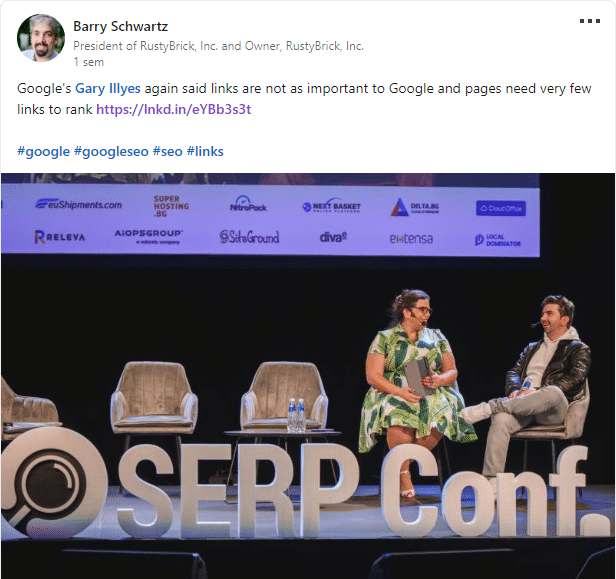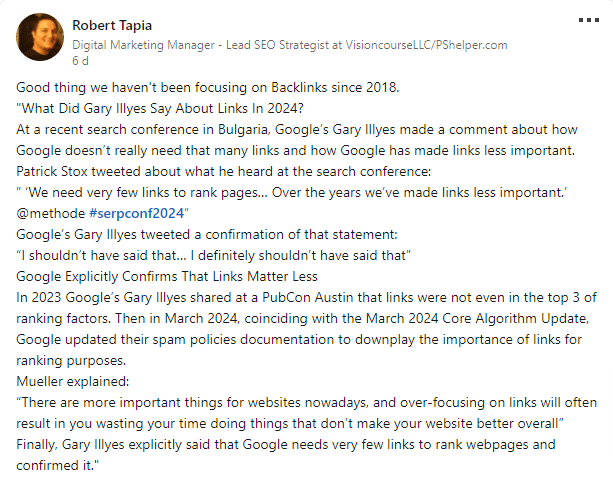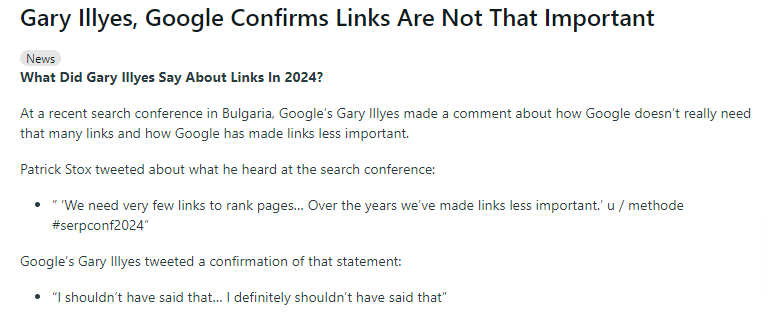Google no longer values links like before, marking a significant shift in SEO strategies. For a long time, getting backlinks was seen as the golden rule of SEO. And as an SEO specialist at Rock Content, I can say that this is something that consumes a substantial time in our monthly calendar activities.
Also, digital marketers have worked hard to build links, often considering them as the primary currency of Google’s ranking algorithm.
But things are taking a surprising turn. At a recent search marketing conference, Gary Illyes from Google shared that the search giant doesn’t rely as much on links to judge a website’s quality and relevance as we thought.
This news is big—it’s shaking up old SEO strategies and making us rethink what really counts in getting to the top of search rankings.
- The Evolving Nature of SEO
- What Matters More Than Links Now?
- Implications for Marketers and Businesses
- Expert Opinions and Industry Reactions
- Global Impact and Future Predictions
- Wrapping Up
The Evolving Nature of SEO
Links used to be the backbone of SEO strategies. Traditionally seen as votes of confidence, the general belief was that more links from trusted sites meant higher rankings on search results.
This drove marketers to aggressively pursue link-building campaigns, trying to gather as many links as possible.
However, the narrative is shifting. Gary Illyes from Google has recently pointed out that links are not the be-all and end-all for assessing a website’s value.
In fact, during a recent search marketing conference, he emphasized that Google is now prioritizing elements that directly affect the user’s online experience.

What does this mean for SEO? Google is refining its algorithms to better appreciate the quality of the content and the intent behind user searches. This includes evaluating how content answers user queries, the usability of websites, and how effectively information is presented. Google’s algorithms are becoming increasingly sophisticated, capable of discerning the context and quality of content beyond mere link patterns.
According to experts and discussions on platforms like Reddit and Linkedin, this transition suggests a significant shift towards holistic content strategies. These strategies prioritize meaningful content that serves the user’s needs over manipulative SEO tactics like excessive link-building. For example, content that is well-researched, well-written, and genuinely useful is likely to perform better under the new criteria.


Moreover, the emphasis on user experience means that factors like website speed, mobile-friendliness, and intuitive navigation are more important than ever. Engaging, interactive content that keeps users on the page longer can also contribute positively to SEO rankings.

This evolution in Google’s approach aligns with broader digital marketing trends emphasizing authenticity and user satisfaction. It challenges marketers to create content that is not only informative but also engaging and user-friendly. By focusing on these aspects, websites can improve their search engine rankings while also building stronger, more meaningful connections with their audience.
Check out our full article about Google’s March 2024 Core Update
What Matters More Than Links Now?
As Google’s algorithms become more sophisticated in understanding the context behind content, it’s clear that other factors are stepping into the spotlight, demanding attention from SEO strategists and content creators.
Here’s a deeper dive into what’s becoming more important than links:
- User Experience (UX): A seamless, intuitive user experience isn’t just nice to have; it’s essential. Google increasingly favors sites that are easy to navigate and engage with, as shown by metrics like time on site and bounce rates. A positive user experience encourages visitors to stay longer, explore more pages, and interact more deeply with the content, all of which signal to Google that your site is valuable.
- Content Quality: Gone are the days when keyword stuffing could get you a top ranking. Today, the relevance, authority, and comprehensiveness (remember the EEAT?) of your content are what matter. High-quality content that addresses user questions in a meaningful way, provides unique insights and covers topics thoroughly is crucial. This type of content not only satisfies user queries but also establishes your site as a trusted resource.
- Mobile-First Design: With the majority of users now accessing the internet via mobile devices, Google’s mobile-first indexing prioritizes sites that perform well on mobile. This means fast loading times, responsive design, and navigable interfaces are critical for ranking well.

- Page Speed: Speed is more important than ever. A fast-loading website enhances user experience, reduces bounce rates, and increases the likelihood of visitors engaging with your content longer. Tools like Google’s PageSpeed Insights can help you identify ways to make your site faster and more efficient.
Deeper Dive into User Experience and Content Quality
- Enhancing User Engagement: Modern SEO strategies place a high value on user engagement metrics. Engaging, interactive content—such as polls, videos, and interactive infographics—can significantly enhance the time spent on your site. These elements make your website not just a source of information but a destination for users to experience and interact with your content.
- Authority and Depth of Content: Google’s shift from keyword density to the depth and breadth of information offered by your content means you need to be an expert—or at least sound like one. Comprehensive content that goes beyond surface-level explanations and delves into detailed analysis attracts both users and search engines. Such content is often formatted as in-depth guides, long-form articles, or detailed case studies that provide substantial value to readers.
Here’s an example of interactive content that can help increase the time spent on a page:
[ion_script src=”https://ionfiles.scribblecdn.net/scripts/ionizer-1.4.2.min.js” hash=”eyJ1cmwiOiIvL2ludGVyYWN0aXZlLnJvY2tjb250ZW50LmNvbS9lbi9ibG9nL3JvaT9faW9uX3RhcmdldD1lbWJlZC0xLjAiLCJpZCI6Il9pb25faW9uaXplcl8xNjk3NDg2ODExOTMyIiwiZnVsbFNjcmVlbiI6ZmFsc2V9″]
Implications for Marketers and Businesses
Moving away from just focusing on links, businesses now need to expand their SEO strategies. It’s important to focus on making high-quality content that fits what your audience is looking for, making your website easy to use, and ensuring it works well on mobile devices. This wider approach is not just about keeping up with Google’s latest rules but also about building a stronger and more dependable online presence.
Expert Opinions and Industry Reactions
Gary Illyes’ recent comments took many in the SEO world by surprise but also made sense to a lot of experts. For a long time, these experts have been saying that it’s better to focus on creating good content and improving the user experience rather than just trying to get as many links as possible. The whole SEO community is starting to agree more with this idea, seeing it as a step toward a more honest and user-friendly approach to the internet.
If you still have questions, here’s what Google says about it:

Global Impact and Future Predictions
- Global SEO Practices: As links become less crucial, SEO strategies around the world might change. We might see more focus on local SEO strategies, which means tailoring content more closely to local audiences and cultural specifics.
- Future of SEO: Looking ahead, SEO is likely to use more artificial intelligence (AI) and machine learning. These technologies can help understand and predict what users want better than before. This means less focus on just getting links and more on really understanding and responding to user needs.
Practical Tips for Adapting to the New SEO Landscape:
To keep up with these changes in SEO, marketers should:
- Create Valuable Content: Focus on making content that really helps your audience, addressing their problems and interests.
- Improve Website User Experience: Make sure your website is easy to use, navigate, and quick to load. This makes visitors more likely to stay longer and explore more.
- Use Analytics Tools: Use tools to watch how visitors behave on your site and use what you learn to make your strategies better.
- Build Genuine Relationships: Instead of just trying to get as many links as possible, focus on building real relationships within your market / audience. This can naturally lead to more genuine links and collaborations.
Wrapping Up
Google’s recent announcement that links aren’t as important as they used to be is a big alert for SEO strategists and marketers. It tells us that we need to keep up with changes in the digital world where making great content and providing a good experience for users are more important than ever.
By paying more attention to these aspects, businesses won’t just improve their position in search results; they’ll also build stronger and more meaningful relationships with the people who visit their websites.
As you adapt to Google’s new SEO priorities, remember that high-quality content and stellar user experience are more crucial than ever. WriterAccess can help.
With access to top-tier professionals including writers, designers, and strategists, plus advanced AI features and an image bank, our platform is designed to streamline your content creation. Experience the power of enhanced content with WriterAccess Humanizer, where AI-generated content is refined with human creativity to ensure it resonates with both your audience and search engines.
Start your journey towards better content and better results—sign up for a free 14-day trial at WriterAccess today!







